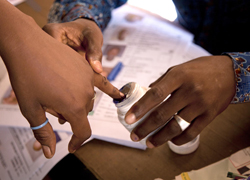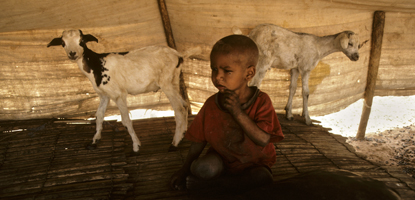Research Brief
Foreign Aid and Malian Democracy
- In Mali aid has had a positive impact on some areas of democratic consolidation such as strengthening the economy and civil society, election support and conflict resolution.
- Three significant structural problems were not addressed properly by donors; weak institutions of accountability, regional cleavages, and the gap between elites and the average Malian.
- Unequal distribution of foreign aid between the centre and periphery further exacerbated the marginalization of certain regions and donors’ slow response time to increasing discontent in some regions may have had a direct impact on the reoccurrence of conflict.
- In some cases aid has sustained the existence of weak executive accountability, hindering checks and balances as well as citizen participation.
In a few short-weeks in early 2012, the northern territory of Mali came under the military control of an Islamist secessionist movement followed by a military coup. Prior to this the donor darling Mali had long been considered a model low-income democracy, with western donors providing the country with aid amounting to around 12-15 per cent of the country’s GNI, totalling around 50 per cent of the government's annual budget. The question of whether donors, possessing such an economic lever, could have done more to help avert the recent political turmoil rises?
What has foreign aid to Mali done for democratic consolidation?
While democracy aid to Mali only accounts for about one per cent of total aid it appears to have had reasonable success. It is worth noting that due to foreign aid and capacity building efforts Mali's civil society has expanded significantly, from a handful of national organizations in the 1970s, to 8,542 associations and 1,125 NGOs officially registered in the late 2000s.

Furthermore economic aid may also have helped promote democratic consolidation through its impact on economic growth. If democratic theory is correct in its belief that economic transformation contributes to democratic consolidation, then any positive effect that aid has had on economic improvements in the country should translate to positive effect on Mali's democracy.
In addition to foreign aid strengthening both the economy and the civil society democracy assistance may have had some positive impact through efforts to facilitate conflict resolution, and electoral assistance. However, three crucial areas in which aid donors could have done more to improve the situation and help to thwart the coming unrest exist.
The strong executive - weak accountability
A strong case can be made that donors have not done enough to address the lack of accountability of the Malian executive branch, and that in some instances aid may actually have worsened this problem. With regard to this vertical accountability donor activity in Mali may have also had a negative effect, as donor involvement with policy-making in the country does not seem to be compatible with the idea of a democratically controlled government. The evidence suggests that many donor-funded policies were not contested by any politicians, and as such citizens could not use their vote to hold the government to account.
Aid can also have the effect of undermining horizontal accountability. For example, it has been suggested that aid may have strengthened the position of President Touré during his two terms (2002-2012), and consequently made remaining in the opposition a less attractive prospect for politicians. Furthermore discussions concerning direct budget support take place outside the legislative process, which may have further diminished the opportunities of the legislature to hold the executive to account.
The elite and an alienated citizenry
A further structural problem identified in Malian democracy is the gap between the masses and the elite. This gap is most obviously demonstrated by the fact that French, a language very few Malians ever master, is the official language of both the highest educational institutions, and the government. However, mass support for Malian democracy has also been undermined by corruption scandals, some of which have involved donor funds. In 2010 Mali’s Minister of Health, was forced to resign because of accusations of corruption surrounding his ministry’s misuse of project funds from the Global Fund to Fight AIDS, Malaria and Tuberculosis. This type of corruption is a clear threat to Malian democracy and a particular concern is the donors’ inability to control the problem despite many years of significant involvement in building state-capacity.

Regional cleavages
A third structural issue weakening Malian democracy is the persistence of regional cleavages, especially the dramatic difference in prosperity between the capital city of Bamako and the other provinces. For example, urban areas of the country have made significant progress in tackling levels of absolute poverty whereas rural areas have seen only minimal improvements. Between 1989 and 2006 absolute poverty levels in urban areas decreased from 72.7 per cent to 31.8 per cent opposed to 80.6 per cent to 79.5 per cent in rural areas. Bamako remains much better off than the national average with its absolute poverty rate at 11 per cent compared to the national average of 64.4 per cent. This regional imbalance should have been addressed by donors as well, as it provides a significant medium term structural challenge for Malian democracy and fuels resentment by groups outside the urban areas, but particularly ones outside Bamako. Given the preponderant role of donor funding in the social sectors—the donors pay an estimated 70 per cent of the government’s investment budget and 30 per cent of current public expenditure––the donor community is clearly not completely blameless in the evolution of regional and class divisions.
Donors have naturally long been aware of the threat to national unity posed by discontent in northern Mali, but have been fairly slow in their response. The north is unstable because it is marginalized, and its instability has led to further marginalization. Given that the instability in the north was a key factor leading to the breakdown of Malian democracy, it seems clear that more pro-active donor behavior in this region could have helped to avert the crisis.
- Donors must heed to the current modalities of foreign aid and reassess their almost exclusive focus on the executive branch of government.
- To further democratic consolidation more attention should be paid to strengthening horizontal accountability in conjunction with vertical accountability.
It is important to note that foreign aid cannot be blamed for the crisis in Mali as the structural issues identified are exceedingly difficult to solve, and the government of Bamako should not be absolved of primary responsibility. However analysis of the situation does suggest that there are several areas in which donor activity was not optimal.
 Join the network
Join the network